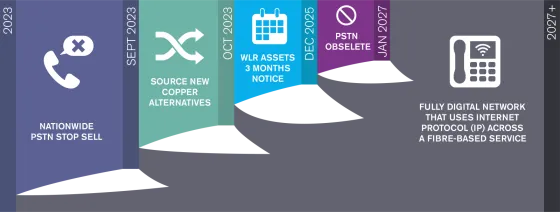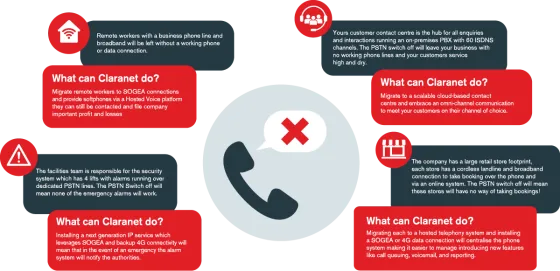The clock is ticking, future-proof your business now.
OpenReach will terminate Service Provider Wholesale line rental contracts by 31st December 2025. After this, any remaining PSTN dependent services may face new commercial terms, which are likely to include a 3-month termination notice, with no guarantee with what might happen next. By 31st January 2027, UK analogue PSTN services will be switched off entirely. If you are still using a telephone landline for calling or to support your broadband, alarm system or fax machines, you must transition to a new service to avoid downtime and service interference.
Let us help you plan for your future
Claranet can help to identify all your legacy systems and devices that will stop working in 2027, as well as plan and migrate services to a version of SIP or Voice for your voice connectivity.
Why choose Claranet?
-
PSTN switch off migration expert advice included
-
Consolidate suppliers and save time and cost
-
Get the most from existing hardware
-
UK support 24x7x365 included
-
Ease of transition to IP voice services at the right time
-
Full range of alternative solutions
PSTN End of Life January 2027
Services on PSTN will no longer work. Mitigate the risk to your business... now. Plan and migrate to a future-proofed business. Reduce costs and increase operational flexibility.
Timeline of activity

How could PSTN switch off affect my business?

Alternative solutions
The PSTN switch off is an opportunity to upgrade your legacy systems to a more reliable, innovative, future proofed solution that can help your business acheive its business goals, all while saving money.
PSTN switch off - key business benefits
Enable Hybrid Work
Embrace flexible working, remove physical phone lines, and migrate to All IP future.
Increase flexibility
Scale your business as required with a flexible infrastructure.
Reduce Costs
IP Solutions require less hardware infrastructure and lower upfront costs.
FAQs
-
Openreach are discontinuing their legacy PSTN network to focus on new and improved modern fibre technology
-
At the time of stop sale, you will no longer be able to renew your contract for the traditional PSTN network based services. Additionally, you will no longer be able to order any new services (new phonelines etc.) to your service.
-
Openreach have provided a list of their stop sell exchange sites and when these will be happening, here.
-
Basically, anything currently using a copper line. In addition to the typical phone and broadband services you initially think of, services such as cctv, alarms, lift lines, door entry systems, fax machines, and card machines will all be affected by the PSTN switch off. Any services that currently use a phone line to work will need to be moved away from the PSTN network ahead of the switch off.
-
Yes, but this requires your current PBX (private telephone system) to be SIP compatible, which can often require costly hardware and licensing upgrades. As an alternative, you could look to migrate to a hosted voice or Microsoft Teams based solution. If your current PBX is SIP ready, or you are looking to migrate to a hosted system, get in touch with Claranet today for us to begin to support you in this transfer.
-
Your telephone lines will stop working, you might no longer be able to take card payments and any ADSL services will stop working.
-
We can work with you to help identify the purpose of your current lines, their usage and replacement options.
-
VOIP offers many more features and at an individual user level is often much cheaper than a traditional PSTN offering. On top of the additional features, you also have better resiliency and control over disaster recovery, enabling your business to offer the level of service your customers expect.
-
The following broadband options are available as alternatives as part of the UK’s move to an All IP future:
- FTTP (fibre to the premise): Providing fibre broadband and internet solutions directly to the property. Ideal for delivering fast broadband for offices and homeworkers with different speed options available.
- SOGEA: (Single order GEA) is one of the next generations of broadband products available as is the typical replacement service for FTTC. SOGEA is similar to FTTC but does not require any underlying voice line to work, making it a data only connectivity line.
- SOADSL: (Single order ADSL) all-IP version of copper broadband providing and alternative to standard ADSL services.
If it looks like you may be stuck with low performance Broadband in your area, Claranet can now provide other options for connectivity which may be available in your area. Please contact your Account Manager or call 0330 390 0507 to speak to an advisor about this.
- FTTP (fibre to the premise): Providing fibre broadband and internet solutions directly to the property. Ideal for delivering fast broadband for offices and homeworkers with different speed options available.
-
When FTTP is not yet available in your area, you can be moved onto the SOGEA network instead. This is a line connection which is for broadband use only. Openreach have confirmed that they will be continually adding to and updating the fibre network and it is expected that FTTP will continue to be rolled out to premises.
-
No, you can migrate your phone number. Claranet can port your number onto the all-IP approach for you.
-
The PSTN service is happening. By acting now, you can futureproof your business, increase business flexibility, and reduce costs. Migrating your services, updating the offices, and replacing the phone system requires time to build a robust plan. Claranet can do the hard work for you, providing you with a modern and bespoke service customised for your specific business needs.
-
Claranet can work with you to replace the traditional PSTN lines that supply these services. However, the provider of this technology will be able to guide you further on how they plan to transfer their equipment to the new all-IP approach.
-
The best option available is FTTP. This delivers an almost guaranteed amount of bandwidth, in the case of Claranet the standard being 80Mbps download and 20Mbps upload (although higher bandwidths are available if required). Availability of this service is subject to location.
The alternative is SOGEA - this provides the same bandwidth that you would receive on FTTC (Fibre to the Cabinet - typically between 5 and 80Mbps download speed and up to 20Mbps upload speed) but allows you to remove the need for a PSTN line to support the broadband. If you are a Claranet customer with an FTTC connection today, contact us and we may be able to convert your FTTC service to SOGEA overnight without you needing to do anything.
-
Claranet will work with you to migrate your services, ensuring that there is minimal impact to your business.
-
Yes you can, and in a number of ways:
- Data connectivity: when you move to a service such a SOGEA or FTTP, you will no longer need to pay for the PSTN line that your existing ADSL or FTTC circuit is dependent upon. In most cases this is worth between £110 and £200 per year dependent on your current provider.
- Telephony: the savings can be much higher and come in four areas; Line Rental, telephone system rental, Call Charges and actually understanding who still needs telephony in your business. A move to Voice over IP can amount to many £thousands per annum in cost reductions, as well as providing better communications tools to your users which give them greater mobility and productivity.
- Data connectivity: when you move to a service such a SOGEA or FTTP, you will no longer need to pay for the PSTN line that your existing ADSL or FTTC circuit is dependent upon. In most cases this is worth between £110 and £200 per year dependent on your current provider.
-
After December 2025, any remaining WLR assets will be subject to new terms that include a three-month termination notice period. It is uncertain what will happen to these lines after this date, it is likely they will be subject to price increases until they are moved to alternative services.







